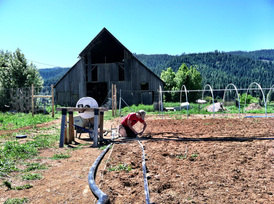
by Cody
There’s a recent op-ed in the NY Times by Bren Smith that’s creating more buzz than a hive of honeybees. Smith argues that while terms like locavore and CSA have now made it into the everyday vernacular of mainstream America, the stars of the current local food movement are the chefs and authors – not the farmers. Despite the success of farmers’ markets and CSA’s throughout the country, 91% of farm household still rely on off-farm income to survive and most farmers are losing money. He argues that farmers need to band together to shape the face of the local food movement and demand reforms before they are left in the dust.
I agree with the basic tenants of his argument but, like Jenna Woginrich, what struck me most about his article was the title, “Don’t Let your Children Grow Up to be Farmers.” It makes me think of the Willie Nelson song my mom used to sing to me:
Mamas don’t let your babies grow up to be farmers.
They’re never at home,
They’re always on the farm,
Even when it doesn’t pay the bills.
Or something like that...
As a beginning farmer in the Sierra Nevada mountains, I get where Smith is coming from. I juggle 4 part-time jobs in addition to the farm. I have student loans and wonder about my ability to support a family. I don’t own the land that I work and don’t know if or when I’ll have to pack up and leave all the infrastructure, soil fertility and perennial plants I’ve toiled away for. Despite all my business planning and financial projections, I wonder about the long-term financial viability of the farm and am constantly searching for creative solutions to stay afloat. My grandmother would roll over in her grave if she knew that I became a farmer instead of a doctor or lawyer like she wanted.
Mamas don’t let your babies grow up to be farmers.
But wait... The average age of farmers in the U.S. is 56. If we don’t let our babies grow up to be farmers, how will our babies and our babies’ babies have the nutritious food they need to live healthy, productive lives? If we keep pushing our babies toward office jobs that encourage unhealthy lifestyles, how can we possibly create a healthy society where they can thrive? If we keep financially supporting farming practices that don’t steward the land, how will we ensure that the food we are feeding our babies isn’t compromising the very ability of their generation to even grow food?
Smith's article calls on farmers to lead the charge for a more sustainable food system that will be viable in the long term. While I agree that small-farmers need to be intimately involved in designing a system that will work for them not against them, I disagree that the rest of society - those benefiting most from the hard work of the farmers - should be allowed or encouraged to step aside in the fight for a fair food system. Consumers need to be educated on the realities facing farmers and on what needs to change in order to make small-scale farming viable. They need to learn about the benefits of local food produced in a manner that supports healthy land and healthy communities. They need to understand the value of real food and start refusing to compromise their health for convenience. They need to start demanding that the food system support their right to healthy, safe food. Mamas, you don’t necessarily have to encourage your babies to be farmers but please encourage them to support farmers and healthy food systems.
Mamas please:
The answer is not to discourage young people from becoming farmers. We need their passion and creativity now more than ever. Mamas please do encourage your babies (and your friends and family) to become farmers, or at least to support healthy food systems.
There’s a recent op-ed in the NY Times by Bren Smith that’s creating more buzz than a hive of honeybees. Smith argues that while terms like locavore and CSA have now made it into the everyday vernacular of mainstream America, the stars of the current local food movement are the chefs and authors – not the farmers. Despite the success of farmers’ markets and CSA’s throughout the country, 91% of farm household still rely on off-farm income to survive and most farmers are losing money. He argues that farmers need to band together to shape the face of the local food movement and demand reforms before they are left in the dust.
I agree with the basic tenants of his argument but, like Jenna Woginrich, what struck me most about his article was the title, “Don’t Let your Children Grow Up to be Farmers.” It makes me think of the Willie Nelson song my mom used to sing to me:
Mamas don’t let your babies grow up to be farmers.
They’re never at home,
They’re always on the farm,
Even when it doesn’t pay the bills.
Or something like that...
As a beginning farmer in the Sierra Nevada mountains, I get where Smith is coming from. I juggle 4 part-time jobs in addition to the farm. I have student loans and wonder about my ability to support a family. I don’t own the land that I work and don’t know if or when I’ll have to pack up and leave all the infrastructure, soil fertility and perennial plants I’ve toiled away for. Despite all my business planning and financial projections, I wonder about the long-term financial viability of the farm and am constantly searching for creative solutions to stay afloat. My grandmother would roll over in her grave if she knew that I became a farmer instead of a doctor or lawyer like she wanted.
Mamas don’t let your babies grow up to be farmers.
But wait... The average age of farmers in the U.S. is 56. If we don’t let our babies grow up to be farmers, how will our babies and our babies’ babies have the nutritious food they need to live healthy, productive lives? If we keep pushing our babies toward office jobs that encourage unhealthy lifestyles, how can we possibly create a healthy society where they can thrive? If we keep financially supporting farming practices that don’t steward the land, how will we ensure that the food we are feeding our babies isn’t compromising the very ability of their generation to even grow food?
Smith's article calls on farmers to lead the charge for a more sustainable food system that will be viable in the long term. While I agree that small-farmers need to be intimately involved in designing a system that will work for them not against them, I disagree that the rest of society - those benefiting most from the hard work of the farmers - should be allowed or encouraged to step aside in the fight for a fair food system. Consumers need to be educated on the realities facing farmers and on what needs to change in order to make small-scale farming viable. They need to learn about the benefits of local food produced in a manner that supports healthy land and healthy communities. They need to understand the value of real food and start refusing to compromise their health for convenience. They need to start demanding that the food system support their right to healthy, safe food. Mamas, you don’t necessarily have to encourage your babies to be farmers but please encourage them to support farmers and healthy food systems.
Mamas please:
- Teach your children the story of their food.
Knowing where and how the food you eat was grown (or God-forbid manufactured) is critical in beginning to understand the impact that your food choices have on society, the environment and your health. - Teach your children what a healthy food system looks like.
What would a food system look like that positively contributes to the health of the environment, the financial security of the community (including the farmers), and the physical health of the consumers? The more you start to define what creates healthy outcomes and support those endeavors, the more common they will become. - Teach your children to value hard work.
In the age of viral videos and YouTube sensations, we are rapidly losing our appreciation for hard work. But clicking 'like' doesn't make healthy food appear on the grocery store shelves; it takes a lot of love and long hours to produce. The work of farmers, just like that of anyone else, should be valued at a fair and living wage. - Teach your children to recognize and appreciate quality.
Americans today spend less of their income on food than any other country and less than any Americans in history. We have been brainwashed into thinking that cheaper is always better, even at the expense of quality. In our quest to get ‘more for less’ we are compromising our health, the environment and the very future of our food system. We need to re-learn what tomatoes should taste like and realize the benefits of eating fresh, high quality food. - Teach your children the difference between needs and wants. Nutritious food is a basic need for a healthy, productive life. In fact it is essential for all life. A smart phone is a want. It is time that we start identifying and valuing our needs over our wants.
The answer is not to discourage young people from becoming farmers. We need their passion and creativity now more than ever. Mamas please do encourage your babies (and your friends and family) to become farmers, or at least to support healthy food systems.

 RSS Feed
RSS Feed
